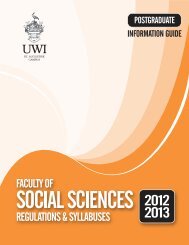Faculty of Humanities and Education (Postgraduate) - The University ...
Faculty of Humanities and Education (Postgraduate) - The University ...
Faculty of Humanities and Education (Postgraduate) - The University ...
Create successful ePaper yourself
Turn your PDF publications into a flip-book with our unique Google optimized e-Paper software.
120<br />
POSTGRADUATE REGULATIONS & SYLLABUSES 2012 - 2013<br />
THE FACULTY OF HUMANITIES & EDUCATION<br />
ASSESSMENT<br />
Assessment <strong>of</strong> work will be based on:<br />
• a report on a small-group task (done by the four members<br />
<strong>of</strong> each school or subsystem represented) on a realistic<br />
problem <strong>of</strong> an organisation (school, divisional <strong>of</strong>fice, central<br />
<strong>of</strong>fice, etc.). <strong>The</strong> problem must be diagnosed <strong>and</strong> solved<br />
holistically, using organisation development methodology.<br />
<strong>The</strong> joint report must not exceed 10,000 words <strong>and</strong> will<br />
be worth 60%. Members <strong>of</strong> each group will be asked to<br />
evaluate total group <strong>and</strong> individual efforts.<br />
• a personal evaluative <strong>and</strong> reflective report on the<br />
underst<strong>and</strong>ings <strong>of</strong> the methods used in the group’s<br />
experience <strong>and</strong> applied to the student’s own work setting.<br />
This will be written in no more than 2,500 words <strong>and</strong> will<br />
carry 40%.<br />
REFERENCES<br />
Burke, W. W. (1982). Organization development: Principles <strong>and</strong><br />
practices. Boston, MA: Little, Brown.<br />
French, W. L., & Bell, C. H. (1999). Organization development:<br />
Behavioral science interventions for organization<br />
improvement (6 th ed.). Upper Saddle River, NJ: Prentice Hall.<br />
French, W. L., Bell, C. H., & Zawacki, R. A. (Eds.). (1989). Organization<br />
development: <strong>The</strong>ory, practice, <strong>and</strong> research (3 rd ed.).<br />
Homewood, IL: Irwin.<br />
Schmuck, R. A., Runkel, P. J., Arends, J. H., & Arends, R. I. (1977). <strong>The</strong><br />
second h<strong>and</strong>book <strong>of</strong> organization development in schools.<br />
Palo Alto, CA: Mayfield.<br />
YEAR:<br />
SEMESTER:<br />
COURSE CODE:EDRS 6116<br />
COURSE TITLE: ACTION RESEARCH<br />
NUMBER OF CREDITS: 4<br />
COURSE DESCRIPTION:<br />
Overview<br />
<strong>The</strong> challenge <strong>of</strong> responding to the development needs <strong>of</strong><br />
a country in the context <strong>of</strong> the global village, characterized<br />
by new technologies, new services, products, occupations,<br />
new ways <strong>of</strong> relating, new ways <strong>of</strong> trading, new ways <strong>of</strong> being,<br />
new possibilities for small countries as well as new barriers, all<br />
make it necessary to adopt a mode <strong>of</strong> openness to adaptation<br />
<strong>and</strong> innovation in all spheres <strong>of</strong> life. A key institution that has<br />
to prepare individuals for this kind <strong>of</strong> existence is the school.<br />
Schools, therefore, must be characterized by innovativeness,<br />
<strong>and</strong> school personnel must possess the capacity for continuous<br />
transformation <strong>and</strong> improvement. Action research is an<br />
approach to organizational life that builds into the organization<br />
the capacity for self-renewal. Action research is informed by a<br />
new paradigm <strong>of</strong> leadership, management/worker relationship,<br />
knowledge, <strong>and</strong> change management.<br />
OBJECTIVES<br />
Students will:<br />
1. be able to distinguish between conventional research <strong>and</strong><br />
action research;<br />
2. explain the principles <strong>of</strong> action research;<br />
3. practise action research principles in their schools;<br />
4. become aware <strong>of</strong> the difficulties <strong>and</strong> potential <strong>of</strong> action<br />
research;<br />
5. become committed to improving their schools;<br />
6. construct a workable research proposal for their school;<br />
7. learn to reflect critically on their views <strong>and</strong> assumptions<br />
about educational change.<br />
CONTENT<br />
Transforming schools – what is involved?<br />
• How to lead the transformation the challenge, the<br />
leadership paradox<br />
• Investigating schools locating self in the institution<br />
• Research a tool for investigation <strong>and</strong> change; elements <strong>of</strong> a<br />
research proposal<br />
• Action research paradigm fundamental principles<br />
• Action research paradigm stating the context for the<br />
study<br />
• Action research paradigm finding the problem, strategies,<br />
<strong>and</strong> tools<br />
• Action research paradigm gathering, sharing, <strong>and</strong><br />
interpreting data<br />
• Action research paradigm deciding interventions <strong>and</strong><br />
evaluation<br />
• Proposal presentation<br />
Methods <strong>of</strong> Delivery<br />
Lectures<br />
Small group sessions<br />
Case studies<br />
Simulations<br />
Video/Film<br />
ASSESSMENT<br />
<strong>The</strong>re will be one assignment. Students must develop a research<br />
proposal in their school context, which can be used for their<br />
practicum field study. This can be done on a phased basis as the<br />
course progresses.

















